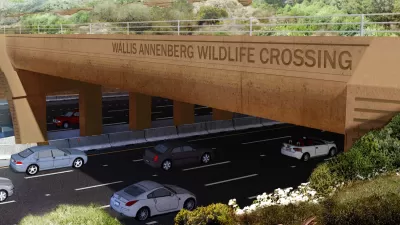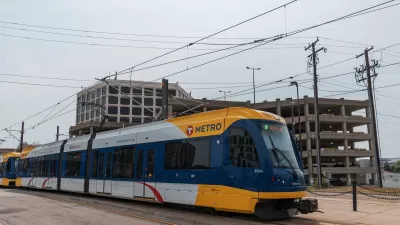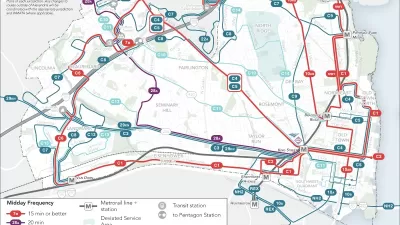A few weeks ago, I was reading yet another think-tank paper arguing against new rail projects. Amidst the sea of technical detail, one assertion bothered me: the common claim that bus service is more “flexible” than rail.
A few weeks ago, I was reading yet another think-tank paper
arguing against new rail projects.
Amidst the sea of technical detail, one assertion bothered me: the
common claim that bus service is more "flexible" than rail.
Indeed it is- and that's precisely what's wrong with
it. Flexibility means unreliability. In particular, flexibility means that politicians can eliminate your bus service whenever
recession or overspending in other areas leads to a fiscal crisis. Bus service is an easy target: it often
serves people too poor to give campaign contributions or become politically
organized, and its environmentalist supporters have dozens of other issues to
worry about. For example, in Denver bus ridership is
rising- yet due to increased fuel costs, service may actually be reduced. (See http://www.9news.com/news/article.aspx?storyid=91837
)
Politicians tend to justify bus cutbacks by stating that
they are merely reducing low-performing service. But as long as there is more than one bus
route in a city, some routes will always have fewer riders than others. So this theory, if consistently applied,
would ultimately lead to the elimination of every route but the most popular
one- hardly a desirable result.
By contrast, recessions and other economic problems tend to
have a relatively modest impact on rail and highway service- perhaps because
the larger up-front costs of rail and highway expansion cannot be recovered by
cutbacks in service, perhaps because affluent, politically influential people
are more willing to drive or ride trains.
Does the reliability of rail service mean transit supporters
and users should support new rail service in every city? Not necessarily; obviously, intracity rail
service is not practical everywhere.
But certainly, this factor is one of many relevant considerations – a
thumb on the scale favoring construction of new subways and light rail systems.
Of course, it is certainly possible to make bus service less
vulnerable to the political winds. For
example, imagine an America in which state or federal civil rights law protected bus
service from cutbacks, on the grounds that cutting bus service without blowing
up the occasional highway or two had a disproportionate impact on racial minorities or adversely affected air quality. In such an America, bus service would be as politically impregnable
as highways or even rail service- and I would certainly be less willing to support
rail service in my city.
But of course, that's not the America I live in.

Pennsylvania Mall Conversion Bill Passes House
If passed, the bill would promote the adaptive reuse of defunct commercial buildings.

World's Largest Wildlife Overpass In the Works in Los Angeles County
Caltrans will soon close half of the 101 Freeway in order to continue construction of the Wallis Annenberg Wildlife Crossing near Agoura Hills in Los Angeles County.

U.S. Supreme Court: California's Impact Fees May Violate Takings Clause
A California property owner took El Dorado County to state court after paying a traffic impact fee he felt was exorbitant. He lost in trial court, appellate court, and the California Supreme Court denied review. Then the U.S. Supreme Court acted.

California Grid Runs on 100% Renewable Energy for Over 9 Hours
The state’s energy grid was entirely powered by clean energy for some portion of the day on 37 out of the last 45 days.

New Forecasting Tool Aims to Reduce Heat-Related Deaths
Two federal agencies launched a new, easy-to-use, color-coded heat warning system that combines meteorological and medical risk factors.

AI Traffic Management Comes to Dallas-Fort Worth
Several Texas cities are using an AI-powered platform called NoTraffic to help manage traffic signals to increase safety and improve traffic flow.
City of Costa Mesa
Licking County
Barrett Planning Group LLC
HUD's Office of Policy Development and Research
Mpact Transit + Community
HUD's Office of Policy Development and Research
Tufts University, Department of Urban and Environmental Policy & Planning
City of Universal City TX
ULI Northwest Arkansas
Write for Planetizen
Urban Design for Planners 1: Software Tools
This six-course series explores essential urban design concepts using open source software and equips planners with the tools they need to participate fully in the urban design process.
Planning for Universal Design
Learn the tools for implementing Universal Design in planning regulations.


























